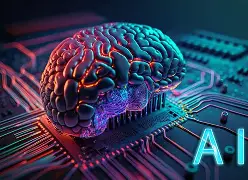செயற்கை நுண்ணறிவு (AI) பயன்பாடு: மனித சிந்தனை திறனை பாதிக்குமா?

தொழில்நுட்ப வளர்ச்சியும் மனித மூளையும்
செயற்கை நுண்ணறிவு (Artificial Intelligence – AI) தொழில்நுட்பங்கள் இன்று நம் வாழ்க்கையின் அங்கமாகி விட்டன. தகவல் தொழில்நுட்பம், கல்வி, மருத்துவம், வணிகம், மற்றும் பல துறைகளில் AI-ன் பங்கு பெரிதாக வளர்ந்துள்ளது. அதே சமயம், இத்தகைய தொழில்நுட்பங்களை அதிகமாகப் பயன்படுத்துவதால் மனித மனதிலும் அதிருப்தி, கவலைகள், மற்றும் சிந்தனை திறனில் பாதிப்புகள் ஏற்படலாம் என்பதும் கவனத்தில் கொள்ளப்பட வேண்டிய விடயம்.
மாசசூசெட்சு தொழில்நுட்பக் கல்வி நிலையம் (MIT) (Massachusetts Institute of Technology) சமீபத்தில் AI பயன்பாட்டின் மன அழுத்தம் மற்றும் நினைவாற்றல் மீது தாக்கங்களை ஆய்வு செய்து அதனை வெளிப்படுத்தியுள்ளது.
MIT ஆய்வின் நோக்கம் மற்றும் நடைமுறை
MIT ஆய்வின் நோக்கம், செயற்கை நுண்ணறிவு (AI) உபயோகப்படுத்தும் போது மனிதர்களின் மூளை செயல்பாட்டில் ஏற்படும் மாற்றங்களை கண்காணிப்பதே ஆகும்.
⚜ஆய்வில் 54 பேர் பங்கேற்றனர்.
⚜4 மாத காலம் பரிசீலனை நடத்தப்பட்டது.
⚜செட் ஜிபிடி (ChatGPT) போன்ற AI செயலிகளின் அடிப்படையில் பயனர்களின் நினைவாற்றல், கவனம் மற்றும் சிந்தனை திறன்களை மதிப்பாய்வு செய்தனர்.
ஆய்வின் முக்கிய கண்டுபிடிப்புகள்
செயற்கை நுண்ணறிவு (AI) உபயோகிப்பவர்கள் மூளை செயல்பாட்டில் 47% மந்த நிலையை வெளிப்படுத்தினர்.
குறிப்பாக, நினைவாற்றல் மற்றும் சிந்தனை சக்தி பாதிக்கப்பட்டது.
AIயை பயன்படுத்தாதவர்களில் இதுபோன்ற குறைபாடு காணப்படவில்லை.
அதிக செயற்கை நுண்ணறிவு (AI) பயன்பாடு மன அழுத்தத்தையும் அதிகரிக்கக்கூடியதாக இருந்தது.

AI தொழில்நுட்பத்தின் நன்மைகள் மற்றும் சவால்கள்
AI-யின் நன்மைகள்
வேலை எளிதாக்கல்: காலமும் முயற்சியும் குறைய, வேலைகளை விரைவாக முடிக்க உதவுகிறது.
தகவல் தேடல்: உடனடி, துல்லியமான தகவல்களை விரைவில் பெற வாய்ப்பு.
கல்வி மற்றும் கற்றல்: தனிப்பட்ட கற்றல் முறைகளை உருவாக்க உதவுகிறது.
புதுமை மற்றும் படைப்பாற்றல்: பாடல்களும், கட்டுரைகளும், வடிவமைப்புகளும் உருவாக்க AI உதவும்.
AI-யால் ஏற்படும் சவால்கள்
சிந்தனை திறன் குறைவு: AI-வின் மேலான நம்பிக்கை மூளையின் இயல்பான சிந்தனையை தளர்த்தும்.
நினைவாற்றல் பாதிப்பு: தானாக பதில் கொடுக்க AI-க்கு நம்பிக்கை வைத்தால், மனித நினைவாற்றல் சுருங்கும்.
பக்கவிளைவுகள்: மன அழுத்தம், கவலை, உறக்கம் குறைவு போன்றவை ஏற்படும் வாய்ப்பு.
போதாமையான AI நம்பிக்கை: தவறான தகவல்களை AI-ல் நம்பி தவறான முடிவுகள் எடுக்கக்கூடும்.
மனித மூளையை பாதுகாக்க AI பொறுப்புடன் பயன்படுத்துவது எப்படி?

AI-வை துணையாக மட்டுமே கருதி பயன்படுத்துதல்
AI மனித அறிவை மாற்றுவதற்கில்லை; அதை மேம்படுத்துவதற்கே பயன்பட வேண்டும்.
சுய சிந்தனை மற்றும் பிரச்சனைகள் தீர்க்கும் திறனை மேம்படுத்துதல்
AI பதில்களை அடிமையாக ஏற்காமல், அவற்றை ஆய்வு செய்து, சுயமாக சிந்திக்க வேண்டும்.
தனித்துவமாக சிந்திப்பதற்கும் படிப்பதற்கும் நேரம் ஒதுக்கல் தினமும் சில நேரம் AI உபயோகத்தை நிறுத்தி, புத்தகம் வாசித்தல், தனிப்பட்ட ஆய்வுகள் செய்வது பயனுள்ளதாக இருக்கும்.
உடல்நலம் மற்றும் மனநலத்திற்கு கவனம் கொடுத்தல் ஒழுங்கான உறக்கம், உடற்பயிற்சி மற்றும் தியானம் மூலம் மனஅழுத்தத்தை குறைக்கவும்.
AI உபயோகத்துக்கான நேர நிர்ணயம் வேலை மற்றும் பொழுதுபோக்கு AI பயன்பாட்டை நேரத்துடன் கட்டுப்படுத்துதல் முக்கியம்.
உலகளாவிய ஆராய்ச்சிகள் மற்றும் எதிர்கால பணிகள்
பல தரப்பிலும் AI மனநல பாதிப்புகளை ஆராயும் முயற்சிகள் மேற்கொள்ளப்படுகின்றன.
தொழில்நுட்ப நிறுவனங்கள் AI பயன்பாட்டிற்கு உத்திகள் (guidelines) உருவாக்கி வருகின்றன.
வருங்காலத்தில், AI உபயோகத்தை மனநல பாதுகாப்புடன் ஒருங்கிணைக்கும் வழிகள் மேம்படுத்தப்படவுள்ளதாக எதிர்பார்க்கப்படுகிறது.
சமூகத்தில் AI தாக்கம் மற்றும் நம்முடைய கடமைகள்
AI தொழில்நுட்பம் மனித வாழ்வை மாற்றி வளர்க்கும் போது, அது உடனடியாக நன்மை மற்றும் தீமைகளை ஏற்படுத்தும்.
நம் சமூகத்தில் AI பற்றி விழிப்புணர்வு, கடமை உணர்வு வளர்க்கப்பட வேண்டும்.
குழந்தைகள் மற்றும் பள்ளி மாணவர்களுக்கு AI பயன்பாட்டை பற்றி விளக்கி, அதன் நன்மைகள் மற்றும் அபாயங்களை அறியச் செய்தல் அவசியம்.
தொழிலாளர்கள், ஆசிரியர்கள் மற்றும் பெற்றோர்கள் AI-க்கு முறையான முறையில் அணுக வழிகாட்டல்.
AI-யை அறிவுடைமை மற்றும் பொறுப்புடன் பயன்படுத்துவோம்!
செயற்கை நுண்ணறிவு தொழில்நுட்பங்கள் நம் வாழ்க்கையில் மிகப்பெரும் மாற்றங்களை கொண்டுவரும் திறன் கொண்டவை. அதே சமயம், அவற்றை தவறான முறையில் அதிகமாகப் பயன்படுத்துதல், மனித மூளை செயல்பாடு மற்றும் நினைவாற்றல் போன்ற மன அறிவுத்திறன்களை பாதிக்கும் அபாயம் உள்ளது. MIT போன்ற முன்னணி கல்வி நிறுவனங்களின் ஆய்வுகள் இதனை தெளிவாக காட்டுகின்றன.
எனவே, AI உபகரணங்களை நமது துணையாக மட்டுமே கருதி, அறிவுடன், கட்டுப்பாட்டுடன், பொறுப்புடன் பயன்படுத்துவதே சிறந்த வழி. இதன் மூலம் நம் சிந்தனை திறன் பாதுகாக்கப்பட்டு, மனநலம் மேம்படும்.
மேலதிக தகவல்களுக்கு மாற்றம் செய்திகள் இணையத்தளத்தினுள் பிரவேசியுங்கள்.
மேலதிக தகவல்களை உடனுக்குடன் பெற்றுக்கொள்ள மாற்றம் செய்திகள் முகநூல் பக்கத்தை பின்தொடரவும்.
Artificial Intelligence (AI) Usage: Is It Affecting Human Thinking Ability?
Introduction: Technological Advancement and the Human Brain
Artificial Intelligence (AI) technologies have become an integral part of our daily lives. AI plays a significant role in various sectors such as information technology, education, healthcare, business, and more. At the same time, excessive use of such technologies can cause stress, anxiety, and impair human cognitive abilities.
Recently, the Massachusetts Institute of Technology (MIT) conducted a study examining the impact of AI usage on mental health and memory functions.
Purpose and Methodology of the MIT Study
The aim of the MIT study was to observe changes in brain function among users of AI technologies.
The study involved 54 participants.
It was conducted over a period of 4 months.
Researchers evaluated memory, focus, and thinking abilities based on the use of AI tools like ChatGPT.
Key Findings of the Study
Users of AI showed a 47% decrease in brain activity.
Memory and cognitive abilities were particularly affected.
No similar decline was observed in non-AI users.
High AI usage was also linked to increased stress levels.
Benefits and Challenges of AI Technology
Benefits of AI
Ease of Work: Reduces time and effort needed to complete tasks efficiently.
Information Retrieval: Provides quick and accurate access to information.
Education and Learning: Helps create personalized learning experiences.
Innovation and Creativity: Assists in generating content such as music, articles, and designs.
Challenges Posed by AI
Reduced Cognitive Ability: Over-reliance on AI can weaken natural thinking skills.
Memory Impairment: Trusting AI for answers may lead to diminished human memory capacity.
Side Effects: Possibility of stress, anxiety, and sleep disturbances.
Excessive Trust: Believing incorrect AI responses can lead to poor decisions.
How to Use AI Responsibly to Protect the Human Brain
Use AI as an Assistant Only
AI should enhance human intelligence, not replace it.
Improve Self-Reflection and Problem-Solving Skills
Don’t accept AI responses blindly—analyze and think critically.
Dedicate Time for Independent Thinking and Reading
Take breaks from AI daily to engage in reading and personal study.
Pay Attention to Physical and Mental Health
Maintain good sleep, exercise regularly, and practice meditation to reduce stress.
Set Time Limits for AI Usage
Manage AI use for work and leisure carefully and thoughtfully.
Global Research and Future Directions
Many countries are investigating the mental health effects of AI.
Tech companies are developing guidelines for responsible AI use.
Future efforts aim to integrate AI usage with mental health safety measures.
Social Impact of AI and Our Responsibilities
While AI transforms human life with both benefits and drawbacks, awareness and responsibility are essential.
Public education on AI’s benefits and risks must be strengthened.
Children and students should be taught about responsible AI use.
Parents, teachers, and workers need guidance on healthy AI engagement.
Conclusion: Use AI Wisely and Responsibly!
Artificial Intelligence has the power to bring tremendous changes to our lives. However, misuse or excessive reliance on AI risks impairing brain function and memory. Studies like the one from MIT clearly highlight these concerns.
Therefore, treating AI tools as helpers, using them wisely, and maintaining control is the best approach. This protects our cognitive abilities and improves mental well-being.



